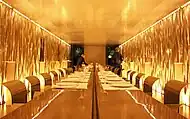Carme Pigem
Carme Pigem Barceló (born Olot, 8 April 1962) is a Spanish architect, a member of the Pritzker Prize-winning architectural firm RCR Arquitectes, together with Ramón Vilalta and Rafael Aranda.
Carme Pigem Barceló | |
|---|---|
_Entretien_avec_Carme_Pigem_-_RCR_arquitecte.jpg.webp) | |
| Born | April 8, 1962 |
| Nationality | Spanish |
| Occupation | Architect |
| Academic work | |
| Discipline | Architecture |
| Institutions | ETH Zurich |
Biography

Between 1977 and 1979, she studied at the School of Fine arts of Olot, and in 1987 graduated in architecture at ETSA Vallés. In 1987 she founded RCR Arquitectes together with Ramón Vilalta and Rafael Aranda.[1]
Between 1992 and 1999 she worked as professor of Architectural Projects at ETSA Vallés and was a member of the board of examiners for the final examinations from 1995 to 2004. From 1997 to 2003 she was professor of Architectural Projects at the ETSAB and a member of the board of examiners in 2003. Since 2005 she has been a visiting professor in the Department of Architecture at the Zurich Institute of Technology (ETHZ), Switzerland.[2]
She was awarded the 2017 Pritzker Prize together with Ramón Vilalta and Rafael Aranda.[3]
In June 2020, she and other architects, as well as chefs, Nobel laureates in Economics and leaders of international organizations, signed the appeal in favour of the purple economy (“Towards a cultural renaissance of the economy”), published in Corriere della Sera,[4] El País[5] and Le Monde.[6]
References
- "RCR KOLEKTIV U ORIS KUĆI ARHITEKTURE Njihovi projekti očaravaju bajkovitim konceptima" (in Croatian). Zagreb, Croatia: Jutarnji. 4 November 2015. Retrieved 16 December 2015.
- "Carme Pigem 1962" (in Spanish). Una Día. 15 November 2015. Retrieved 16 December 2015.
- "Announcement: Rafael Aranda, Carme Pigem and Ramon Vilalta | The Pritzker Architecture Prize". www.pritzkerprize.com. Archived from the original on 2017-03-02. Retrieved 2017-03-01.
- "Per un rinascimento culturale dell'economia". Corriere della Sera (in Italian). 7 June 2020. Retrieved 22 June 2020.
- "Por un renacimiento cultural de la economía". El País (in Spanish). 7 June 2020. Retrieved 22 June 2020.
- "En dépit de son importance croissante, le culturel n'a pas suffisamment été pensé comme un écosystème". Le Monde (in French). 7 June 2020. Retrieved 22 June 2020.